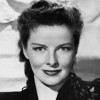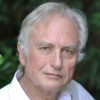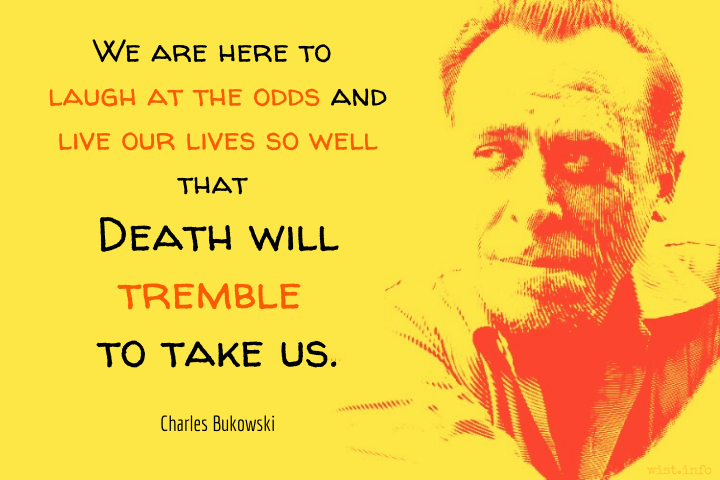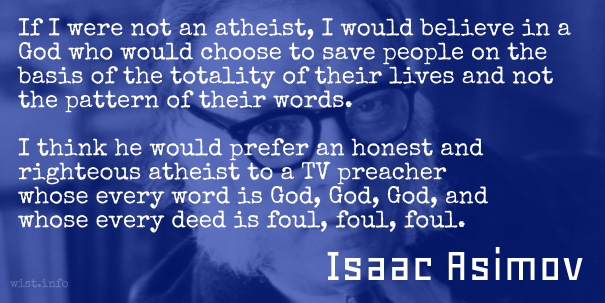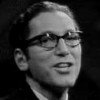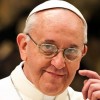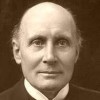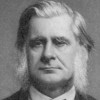I could no longer reconcile the claims of faith with the facts of life. In particular, I could no longer explain how there can be a good and all-powerful God actively involved with this world, given the state of things. For many people who inhabit this planet, life is a cesspool of misery and suffering. I came to a point where I simply could not believe that there is a good and kindly disposed Ruler who is in charge of it.
Quotations about:
atheism
Note not all quotations have been tagged, so Search may find additional quotes on this topic.
Nothing enlarges more the Gulf of Atheism, than that Μέγα Χάσμα, wide passage, which lies between the Faith and Lives of Men pretending to be Christians.
Edward Stillingfleet (1635-1699) British Christian theologian, polemicist, preacher, prelate
Origines Sacræ, “The Epistle Dedicatory” (1663)
(Source)
Your petitioners are Atheists and they define their beliefs as follows. An Atheist loves his fellow man instead of god. An Atheist believes that heaven is something for which we should work now — here on earth for all men together to enjoy. An Atheist believes that he can get no help through prayer but that he must find in himself the inner conviction, and strength to meet life, to grapple with it, to subdue it, and enjoy it. An Atheist believes that only in a knowledge of himself and a knowledge of his fellow man can he find the understanding that will help to a life of fulfillment. He seeks to know himself and his fellow man rather than to know a god. An Atheist believes that a hospital should be built instead of a church. An Atheist believes that deed must be done instead of a prayer said. An Atheist strives for involvement in life and not escape into death. He wants disease conquered, poverty vanished, war eliminated. He wants man to understand and love man. He wants an ethical way of life. He believes that we cannot rely on god nor channel action into prayer nor hope for an end of troubles in a hereafter. He believes that we are the keepers of our own lives and that we are our brother’s keeper; that we are responsible persons and that the job is here and the time is now.
Madalyn Murray O'Hair (1919-1995) American atheist, civil rights activist
Petition for Relief (1959), Murray v. Curlett 371 U.S. 809 (1962)
(Source)
Originally written as a Letter to the Editor of the Baltimore Post. Murray v Curlett was later folded into Abington School District v. Schempp 374 U.S. 203 (1963), in which the US Supreme Court ruled that public school-sponsored ceremonial reading from the Bible and recitation of the Lord's Prayer was unconstitutional.
An atheist doesn’t have to be someone who thinks he has a proof that there can’t be a god. He only has to be someone who believes that the evidence on the God question is at a similar level to the evidence on the werewolf question.
John McCarthy (1927-2011) American computer scientist, cognitive scientist, artificial intelligence pioneer
Usenet, rec.arts.books (1992-07-23)
(Source)
Doth any man assert that there are Gods
In Heaven? I answer there are none: let him
Who contradicts me like a fool, no longer
Quote ancient fables; but observe the fact,
Nor to my words give credence. Kings, I say.
Kill many, but rob more of their possessions.
And violating every sacred oath,
Lay waste whole cities; yet, tho’ they act thus,
Are more successful far than they who lead
In constant piety a tranquil life.[φησίν τις εἶναι δῆτ’ ἐν οὐρανῷ θεούς;
οὐκ εἰσίν, οὐκ εἴσ’, εἴ τις ἀνθρώπων θέλει
μὴ τῷ παλαιῷ μῶρος ὢν χρῆσθαι λόγῳ.
σκέψασθε δ’ αὐτοί, μὴ ἐπὶ τοῖς ἐμοῖς λόγοις
γνώμην ἔχοντες. φήμ’ ἐγὼ τυραννίδα
κτείνειν τε πλείστους κτημάτων τ’ ἀποστερεῖν
ὅρκους τε παραβαίνοντας ἐκπορθεῖν πόλεις·
καὶ ταῦτα δρῶντες μᾶλλόν εἰσ’ εὐδαίμονες
τῶν εὐσεβούντων ἡσυχῇ καθ’ ἡμέραν]Euripides (485?-406? BC) Greek tragic dramatist
Bellerophon [Βελλεροφῶν], frag. 286 (TGF) (c. 430 BC) [tr. Wodhull (1809)]
(Source)
Nauck (TGF) frag. 286, Barnes frag. 8, Musgrave frag. 25. (Source (Greek)). Alternate translations:
Doth some one say that there be gods above?
There are not; no, there are not. Let no fool,
Led by the old false fable, thus deceive you.
Look at the facts themselves, yielding my words
No undue credence: for I say that kings
Kill, rob, break oaths, lay cities waste by fraud,
And doing thus are happier than those
Who live calm pious lives day after day. All divinity
Is built-up from our good and evil luck.
[tr. Symonds (1876)]
Does someone say there are indeed gods in heaven? There are not, there are not, if a man is willing not to rely foolishly on the antiquated reasoning. Consider for yourselves, do not base your opinion on words of mine. I say myself that tyranny kills very many men and dprives them of their possessions; and that tyrants break their oaths to ransack cities, and in doing this they are more prosperous under heaven than men who live quietly in reverence.
[tr. Collard, Hargreaves, Cropp (1995)]
Does anyone assert that there are gods in heaven? There are not, no, there are not, if a man is ready not to swallow whole the old tales. Think it through yourselves, do not make my words the foundation of your opinion. I declare that tyranny kills many, robs them, that tyrants break their oaths to plunder cities, yet in this they prosper more than those whose unassuming habit is true piety.
[tr. Stevens (2012)]
Does anyone say there are gods in heaven? There are not, there are not, unless one wishes to follow ancient wisdom like a fool. [...] I say that tyranny kills many people, deprives possessions, circumvents oaths, and plunders cities. And even though they do these things, they are more fortunate than those living piously day to day in peace.
[tr. Dixon (2014)]
Is there anyone who thinks there are gods in heaven?
There are not. There are not, for any man who wishes
Not to be a fool and trust some ancient story.
Look at it yourselves, don’t make up your mind
Because of my words. I think that tyranny
Kills so many men and steals their possessions
And that men break their oaths by sacking cities.
But the men who do such things are more fortunate
Than those who live each day piously, at peace.
[tr. @sentantiq (2015)]
People ask: Do gods really exist in heaven? No, they do not exist, they really don’t; if any of mankind wishes to avoid being the sort of fool who follows the ancient story. Consider it for yourselves, don’t take my word for it. I say that tyranny destroys multitudes and confiscates their possessions; oath-breakers sack cities; and yet, those who do such things are far more prosperous than those who, day by day, live devoutly and in peace.
[tr. Emerson]
The greatest single cause of atheism in the world today is Christians who acknowledge Jesus with their lips and walk out the door and deny Him by their lifestyle. That is what an unbelieving world simply finds unbelievable.
I’m an atheist, and that’s it. I believe there’s nothing we can know except that we should be kind to each other and do what we can for other people.
Katharine Hepburn (1907-2003) American actress
“Kate Talks Straight,” interview by Myrna Blyth, Ladies’ Home Journal (1991-10)
(Source)
In fact, “atheism” is a term that should not even exist. No one ever needs to identify himself as a “non-astrologer” or a “non-alchemist.” We do not have words for people who doubt that Elvis is still alive or that aliens have traversed the galaxy only to molest ranchers and their cattle. Atheism is nothing more than the noises reasonable people make in the presence of unjustified religious beliefs.
Sam Harris (b. 1967) American author, philosopher, neuroscientist
Letter to a Christian Nation (2006)
(Source)
It is often said […] that although there is no positive evidence for the existence of God, nor is there evidence against his existence. So it is best to keep an open mind and be agnostic. At first sight that seems an unassailable position, at least in the weak sense of Pascal’s wager. But on second thoughts it seems a cop-out, because the same could be said of Father Christmas and tooth fairies. There may be fairies at the bottom of the garden. There is no evidence for it, but you can’t prove that there aren’t any, so shouldn’t we be agnostic with respect to fairies?
That in the Heavens no gods there be
Selius affirms, and proves, ’cause he
Still thinking so lives happily.[Nullos esse deos, inane caelum
Adfirmat Segius: probatque, quod se
Factum, dum negat haec, videt beatum.]Martial (AD c.39-c.103) Spanish Roman poet, satirist, epigrammatist [Marcus Valerius Martialis]
Epigrams [Epigrammata], Book 4, epigram 21 (4.21) (AD 89) [tr. May (1629)]
(Source)
(Source (Latin)). Alternate translations:
That heav'ns are voide, & that no gods there are,
Rich Paulus saith, and all his proofe is this:
That while such blasphemies pronounce he dare,
He liveth here in ease, and earthly blisse.
[tr. Harington (1618), ep. 110 (Book 2, ep. 14), "Against an Atheist"]
Selius affirms, in heav'n no gods there are:
And while he thrives, and they their thunder spare,
His daring tenet to the world seems fair.
[tr. Killigrew (1695)]
Selius asserts, there is no providence:
Anmd what he thus asserts, he proves from hence;
Tht such a villain as himself still lives;
And, what is more, is courted too, and thrives.
[tr. Hay (1755)]
A Selius swears there is no god,
And thus attests an oath so odd.
Heaven has no habitant, quoth he;
Else how could heaven so smile on me?
[tr. Elphinston (1782), Book 7, ep. 12]
That there's no God, John gravely swears,
And quotes, in proof, his own affairs;
For how should such an atheist thrive,
If there was any God alive?
[Anon., Westminster Review, 1853-04]
Selius affirms that there are no Gods, and that Heaven is empty; and he produces a proof of his assertion; viz. that while he denies all Providence, he beholds himself affluent.
[tr. Amos (1858)]
Selius affirms that there are no gods, and that heaven is empty; and thinks he has sufficient proof of his opinion in seeing himself become rich while he maintains it.
[tr. Bohn's Classical (1859)]
"There are no gods: heaven is empty," Segius asserts; and he proves it, for in the midst of these denials he sees himself made rich!
[tr. Ker (1919)]
When Segius declaims he knows
That Heaven is void and gods are not,
It is because his record shows
That knaves may have a prosperous lot.
[tr. Pott & Wright (1921), "The Test of Facts"]
"There are no gods," says Segius, "and the blue
Is void." He lives and thrives and proves it true.
[tr. Francis & Tatum (1924), ep. 169]
"There are no gods, and heaven's all a lie!
No gods," said Segius, "give a damn or care
What happens to us." And he must be right:
Today the rat's a multi-millionaire.
[tr. Marcellino (1968)]
Sergius swears by the hollow sky that there are no gods,
and the truth is plain, since he,
denouncing them, is wealthy as can be.
[tr. Bovie (1970)]
"The skies are empty
and the gods are dead,"
says Segius, the proof of which
is that he sees himself made rich.
[tr. Porter (1972)]
"God doesn't exist, there's no one in the skies,"
Says Segius. If it's justice he denies,
He's right: would he be wealthy otherwise?
[tr. Michie (1972)]
Segius declares that there are no gods, that the sky is empty; and proves it, for in the course of these denials he sees himself become a rich man.
[tr. Shackleton Bailey (1993)]
This darkling world he claims, with rue
Has run itself into a ditch.
And he can prove his thesis true:
In such a cosmos -- he is rich.
[tr. Wills (2007)]
Segius says there are no gods, no heaven.
The proof he offers? He's a rich man.
[tr. Kennelly (2008), "Proof"]
Segius asserts that there are no gods, that heaven is empty. And he’s the proof, because, even as he denies these things, he sees that he’s become prosperous.
[tr. @aleatorclassicus (2012)]
Segius claims there are no gods, the skies
are bare. He proves it, too: while he denies
the gods exist, he sees his fortune rise.
[tr. McLean (2014)]
The question I get asked by religious people all the time is, without God, what’s to stop me from raping all I want? And my answer is: I do rape all I want. And the amount I want is zero. And I do murder all I want, and the amount I want is zero. The fact that these people think that if they didn’t have this person watching over them that they would go on killing, raping rampages is the most self-damning thing I can imagine. I don’t want to do that. Right now, without any god, I don’t want to jump across this table and strangle you. I have no desire to strangle you. I have no desire to flip you over and rape you.
Penn Jillette (b. 1955) American stage magician, actor, musician, author
“Penn Jillette Rapes All the Women He Wants To,” Interview by Ron Bennington,Interrobang (30 Apr 2012)
(Source)
And I’ve always said, you know, that I don’t respect people that don’t proselytize. I don’t respect that at all. If you believe that there’s a heaven and hell, and people could be going to hell — or not getting eternal life, or whatever — and you think that, “Well, it’s not really worth tellin’ ’em this, because it would make it socially awkward.” And atheists who think that people shouldn’t proselytize, “Just leave me alone. Keep your religion to yourself.” How much do you have to hate somebody to not proselytize? How much do you have to hate somebody to believe that everlasting life is possible and not tell them that?
I mean, if I believe, beyond a shadow of a doubt, that a truck was coming at you and you didn’t believe it, that a truck was bearing down on you, there’s a certain point where I tackle you — and this is more important than that.
Penn Jillette (b. 1955) American stage magician, actor, musician, author
“A Gift of a Bible,” Penn Says, ep. 192 (9 Dec 2008)
(Source)
This is an extraordinarily irritating book, written by one of those people who smugly believe that, having lost their faith, they must ipso facto have found their reason.
Christopher Hitchens (1949-2011) English intellectual, polemicist, socio-political critic
“David Mamet’s Right-Wing Conversion,” New York Times (17 Jun 2011)
(Source)
Reviewing David Mamet’s The Secret Knowledge.
If you suspect that my interest in the Bible is going to inspire me with sudden enthusiasm for Judaism and make me a convert of mountain‐moving fervor and that I shall suddenly grow long earlocks and learn Hebrew and go about denouncing the heathen — you little know the effect of the Bible on me. Properly read, it is the most potent force for atheism ever conceived.
Isaac Asimov (1920-1992) Russian-American author, polymath, biochemist
Quoted in Janet Jeppson Asimov, Notes for a Memoir: On Isaac Asimov, Life, and Writing (2006)
(Source)
It was easier for me to think of a world without a creator than of a creator loaded with all of the contradictions of the world.
Simone de Beauvoir (1908-1986) French author, existentialist philosopher, feminist theorist
Quoted in “Toward a Hidden God,” Time (8 Apr 1966)
(Source)
For those who believe in God, most of the big questions are answered. But for those of us who can’t readily accept the God formula, the big answers don’t remain stone-written. We adjust to new conditions and discoveries. We are pliable. Love need not be a command or faith a dictum. I am my own God. We are here to unlearn the teachings of the church, state and our educational system. We are here to drink beer. We are here to kill war. We are here to laugh at the odds and live our lives so well that Death will tremble to take us.
Charles Bukowski (1920-1994) German-American author, poet
“The Meaning of Life: The Big Picture,” Life Magazine (Dec 1988)
(Source)
The most dangerous type of atheism is not theoretical atheism, but practical atheism — that’s the most dangerous type. And the world, even the church, is filled up with people who pay lip service to God and not life service. And there is always a danger that we will make it appear externally that we believe in God when internally we don’t. We say with our mouths that we believe in him, but we live with our lives like he never existed. That is the ever-present danger confronting religion. That’s a dangerous type of atheism.
Martin Luther King, Jr. (1929-1968) American clergyman, civil rights leader, social activist, preacher
“Rediscovering Lost Values,” sermon, Second Baptist Church, Detroit (28 Feb 1954)
(Source)
As the man put it: Any sufficiently advanced technology is indistinguishable from magic. Any sufficiently advanced alien intelligence is indistinguishable from God — the angry monotheistic sadist subtype. And the elder ones … aren’t friendly. (See? I told you I’d rather be an atheist!)
“Do unto others …” is a good rule of thumb. I live by that. Forgiveness is probably the greatest virtue there is. But that’s exactly what it is -‐ a virtue. Not just a Christian virtue. No one owns being good. I’m good. I just don’t believe I’ll be rewarded for it in heaven. My reward is here and now. It’s knowing that I try to do the right thing. That I lived a good life. And that’s where spirituality really lost its way. When it became a stick to beat people with. “Do this or you’ll burn in hell.”
You won’t burn in hell. But be nice anyway.
Ricky Gervais (b. 1961) English comedian, actor, director, writer
“Why I’m an Atheist,” Wall Street Journal (19 Dec 2010)
(Source)
And therefore it was a good answer that was made by one who when they showed him hanging in a temple a picture of those who had paid their vows as having escaped shipwreck, and would have him say whether he did not now acknowledge the power of the gods, — “Aye,” asked he again, “but where are they painted that were drowned after their vows?”
[Taque recte respondit ille, qui, cum suspensa tabula in templo ei monstraretur eorum qui vota solverant, quod naufragii periculo elapsi sint, atque interrogando premeretur, anne tum quidem Deorum numen agnosceret, quaesivit denuo, At ubi sunt illi depicti qui post vota nuncupata perierint?]
Francis Bacon (1561-1626) English philosopher, scientist, author, statesman
Instauratio Magna [The Great Instauration], Part 2 “Novum Organum [The New Organon],” Book 1, Aphorism # 46 (1620) [tr. Spedding (1858)]
(Source)
The reference is to Diagoras, in Cicero, De Natura Deorum, 3.37, or to Diogenes the Cynic, in Diogenes Laertius, Lives of Eminent Philosophers, 6.59.
(Source (Latin)). Alternate translations:
It was well answered by him who was shown in a temple the votive tablets suspended by such as had escaped the peril of shipwreck, and was pressed as to whether he would then recognise the power of the gods, by an inquiry; "But where are the portraits of those who have perished in spite of their vows?"
[tr. Wood (1831)]
And so he made a good answer, who, when he was shown, hung up in the temple, the votive tablets of those who had fulfilled their vows after escaping from shipwreck, and was pressed with the question, "Did he not then recognize the will of the gods?" asked, in his turn, "But where are the pictures of those who have perished, notwithstanding their vows?"
[tr. Johnson (1859)]
So when someone was shown a votive tablet in a temple dedicated, in fulfilment of a vow, by some men who had escaped the danger of shipwreck, and was pressed to say whether he would now recognise the divinity of the gods, he made a good reply, when he retorted: "Where are the offerings of those who made vows and perished?"
[tr. Silverthorne (2000)]
A man was shown a picture, hanging in a temple, of people who had made their vows and escaped shipwreck, and was asked ‘Now do you admit the power of the gods?’ He answered with a question: ‘Where are the pictures of those who made their vows and then drowned?’ It was a good answer!
[tr. Bennett (2017)]
It is a profound mistake to imagine that Christianity ever intended to dissipate the bewilderment and even the terror, the sense of our own nothingness, which come upon us when we think about the nature of things. It comes to intensify them. Without such sensations there is no religion. Many a man, brought up in the glib profession of some shallow form of Christianity, who comes through reading Astronomy to realise for the first time how majestically indifferent most reality is to man, and who perhaps abandons his religion on that account, may at that moment be having his first genuinely religious experience.
I am an atheist, out and out. It took me a long time to say it. I’ve been an atheist for years and years, but somehow I felt it was intellectually unrespectable to say one was an atheist, because it assumed knowledge that one didn’t have. Somehow it was better to say one was a humanist or an agnostic. I finally decided that I’m a creature of emotion as well as of reason. Emotionally I am an atheist. I don’t have the evidence to prove that God doesn’t exist, but I so strongly suspect he doesn’t that I don’t want to waste my time.
If I were not an atheist, I would believe in a God who would choose to save people on the basis of the totality of their lives and not the pattern of their words. I think he would prefer an honest and righteous atheist to a TV preacher whose every word is God, God, God, and whose every deed is foul, foul, foul.
No one is more dangerous than someone who thinks he has “The Truth”. To be an atheist is almost as arrogant as to be a fundamentalist. But then again, I can get pretty arrogant.
“Even if some details of dogma aren’t true — or even all of ’em — think what a consolation religion and the church are to weak humanity!”
“Are they? I wonder! Don’t cheerful agnostics, who know they are going to die dead, worry much less than good Baptists, who worry lest their sons and cousins and sweethearts fail to get into the Baptist heaven — or what is even worse, who wonder if they may not have guessed wrong — if God may not be a Catholic, maybe, or a Mormon or Seventh-day Adventist instead of a Baptist, and then they’ll go to hell themselves. Consolation? No!”
The Lord has redeemed all of us, all of us, with the Blood of Christ: all of us, not just Catholics. Everyone! “Father, the atheists?” Even the atheists. Everyone! And this Blood makes us children of God of the first class. We are created children in the likeness of God and the Blood of Christ has redeemed us all. And we all have a duty to do good. And this commandment for everyone to do good, I think, is a beautiful path towards peace. If we, each doing our own part, if we do good to others, if we meet there, doing good, and we go slowly, gently, little by little, we will make that culture of encounter: We need that so much. We must meet one another doing good. “But I don’t believe, Father, I am an atheist!” But do good: We will meet one another there.
Francis I (b. 1936) Argentinian Catholic Pope (2013- ) [b. Jorge Mario Bergoglio]
Homily (22 May 2013)
(Source)
The trouble about God is that he is like a person who never acknowledges one’s letters and so, in time, one comes to the conclusion either that he does not exist or that you have got the address wrong. I admitted that it was of great moment: but what was the use of going on dispatching fervent messages — say to Edinburgh — if they all came back through the dead letter office: nay more, if you couldn’t even find Edinburgh on the map.
I still think the argument from design the weakest possible ground for Theism, and what may be called the argument from un-design the strongest for Atheism.
C. S. Lewis (1898-1963) English writer, literary scholar, lay theologian [Clive Staples Lewis]
Letter to Alan Griffiths (20 Dec 1946)
(Source)
When a young man who has been going to church in a routine way honestly realises that he does not believe in Christianity and stops going — provided he does it for honesty’s sake and not just to annoy his parents — the spirit of Christ is probably nearer to him then than it ever was before.
C. S. Lewis (1898-1963) English writer, literary scholar, lay theologian [Clive Staples Lewis]
Mere Christianity, “Let’s Pretend” (1952)
(Source)
I doubt that anyone does not really believe in God. People may think they don’t have any belief, but you will usually find that there is a belief in something beyond himself. In any case, I would not judge a man’s character by his belief or unbelief. I would judge his character by his deeds; and no matter what he said about his beliefs, his behavior would soon show whether he was a man of good character or bad.
Idolatry is worse than atheism.
Abdal Hakim Murad (b. 1960) British Muslim shaykh, researcher, writer, academic [b. Timothy John Winter]
“Contentions 2,” #37
(Source)
“I believe that the Bible is the literal word of God.” And I say no, it’s not, Dad. “Well, I believe that it is.” Well, you know, some people believe they’re Napoleon. That’s fine. Beliefs are neat. Cherish them, but don’t share them like they’re the truth.
The Old Testament is responsible for more atheism, agnosticism, disbelief — call it what you will — than any book ever written; it has emptied more churches than all the counterattractions of cinema, motor bicycle and golf course.
Christianity has probably the most flexible morals of any religion, because Jesus left no code of law behind him like Moses or Muhammad, and his moral precepts are so different from those of ordinary life that no society has ever made any serious attempt to carry them out, such as was possible in the case of Israel and Islam. But every Christian church has tried to impose a code of morals of some kind for which it has claimed divine sanction. As these codes have always been opposed to those of the gospels a loophole has been left for moral progress such as hardly exists in other religions. This is no doubt an argument for Christianity as against other religions, but not as against none at all, or as against a religion which will frankly admit that its mythology and morals are provisional. That is the only sort of religion that would satisfy the scientific mind, and it is very doubtful whether it could properly be called a religion at all.
J.B.S. Haldane (1892-1964) English geneticist [John Burden Sanderson Haldane]
“Daedalus, or Science and the Future,” speech, Cambridge (24 Feb 1923)
(Source)
My practice as a scientist is atheistic. That is to say, when I set up an experiment I assume that no god, angel, or devil is going to interfere with its course; and this assumption has been justified by such success as I have achieved in my professional career. I should therefore be intellectually dishonest if I were not also atheistic in the affairs of the world.
“There are no atheists in foxholes” isn’t an argument against atheism, it’s an argument against foxholes.
James Morrow (b. 1947) American author, humanist
Towing Jehovah, Part 2, “Famine” (1994)
(Source)
Paraphrase of this passage:
"There are no atheists in foxholes, people say, and it's so true, it's so fucking true." Cassie swallowed, savoring the aftertaste of the Cheerios. "No ... no, I'm being too hard on myself. That maxim, it's not an argument against atheism -- it's an argument against foxholes."
I was told that the Chinese said they would bury me by the Western Lake and build a shrine to my memory. I have some slight regret that this did not happen as I might have become a god, which would have been very chic for an atheist.
I contend we are both atheists. I just believe in one fewer god than you do. When you understand why you dismiss all the other possible gods, you will understand why I dismiss yours.
Stephen F. Roberts (b. c. 1969) American software developer
Usenet, alt.atheism, sig line (early 1995)
(Source)
See Roberts' "Brief History of the Quote" for more on its origins.
As he is not a prominent public figure, the quote is frequently attributed to others, usually of the same name. Possibly most famously, Sam Harris misattributed it to Australian historian Stephen Henry Roberts in his article "10 Myths -- and 10 Truths -- about Atheism," Los Angeles Times (2006-12-24) (since corrected by Harris).
The quotation is often given with an extra word: "I contend that we are both atheists ...." Roberts himself uses the shorter version.
What use is it to us to hear it said of a man that he has thrown off the yoke, that he does not believe there is a God to watch over his actions, that he reckons himself the sole master of his behavior, and that he does not intend to give an account of it to anyone but himself? Does he think that in that way he will have straightway persuaded us to have complete confidence in him, to look to him for consolation, for advice, and for help, in the vicissitudes of life? Do such men think that they have delighted us by telling us that they hold our souls to be nothing but a little wind and smoke — and by saying it in conceited and complacent tones? Is that a thing to say blithely? Is it not rather a thing to say sadly — as if it were the saddest thing in the world?
And if you seek a preservative against these snares, I say, strive earnestly to learn something, not only of the results, but of the methods of science, and then apply those methods to all statements which offer themselves for your belief. If they will not stand that test, they are nought, let them come with what authority they may.
T. H. Huxley (1825-1895) English biologist [Thomas Henry Huxley]
“Science and Religion,” lecture (Dec 1858)
(Source)
Quoted in The Government School of Mines, The Builder (Jan 1859)
When man comes to the realization that he is not the “favorite” of God; that he was not specifically created, that the universe was not made for his benefit, and that he is subject to the same laws of nature as all other forms of life, then, and not until then, will he understand that he must rely upon himself, and himself alone, for whatever benefits he is to enjoy; and devote his time and energies to helping himself and his fellow men to meet the exigencies of life and to set about to solve the difficult and intricate problems of living.
Joseph Lewis (1889-1968) American activist, publisher, educator
“An Atheist Manifesto” (1954)
If we did a good act merely from the love of god, and a belief that it is pleasing to him, whence arises the morality of the Atheist? It is idle to say as some do, that no such being exists. We have the same evidence of the fact as of most of those we act on, to wit, their own affirmations, and their reasonings in support of them. I have observed indeed generally that, while in protestant countries the defections from the Platonic Christianity of the priests is to Deism, in Catholic countries they are to Atheism. Diderot, Dalembert, D’Holbach Condorcet, are known to have been among the most virtuous of men. Their virtue then must have had some other foundation than the love of god.
Thomas Jefferson (1743-1826) American political philosopher, polymath, statesman, US President (1801-09)
Letter to Thomas Law (13 Jun 1814)
(Source)
The most preposterous notion that H. sapiens has ever dreamed up is that the Lord God of Creation, Shaper and Ruler of all the Universes, wants the saccharine adoration of His creatures, can be swayed by their prayers, and becomes petulant if He does not receive their flattery. Yet this absurd fantasy, without a shred of evidence to bolster it, pays all the expenses of the oldest, largest, and least productive industry in all history.
The staircase that leads to God. What does it matter if it is make-believe, if we really climb it? What difference does it make who builds it, or if it is made of marble or word, of brick, stone, or mud? The essential thing is that it be solid and that in climbing it we feel the peace that is inaccessible to those who do not climb it.
In view of such harmony in the cosmos which I, with my limited human mind, am able to recognize, there are yet people who say there is no God. But what really makes me angry is that they quote me for the support of such views.
Albert Einstein (1879-1955) German-American physicist
Conversation (c. 1941), quoted in Hubertus zu Löwenstein, Towards the Further Shore (1968)
(Source)
I concur with you strictly in your opinion of the comparative merits of atheism and demonism, and really see nothing but the latter in the being worshipped by many who think themselves Christians.
Thomas Jefferson (1743-1826) American political philosopher, polymath, statesman, US President (1801-09)
Letter to Richard Price (8 Jan 1789)
(Source)
Price had written to Jefferson on 26 Oct 1788 about the harm done by religion and wrote "Would not Society be better without Such religions? Is Atheism less pernicious than Demonism?"
I had rather believe all the fables in the legends and the Talmud and the Alcoran, than that this universal frame is without a mind.
Francis Bacon (1561-1626) English philosopher, scientist, author, statesman
“Of Atheism,” Essays, No. 16 (1625)
(Source)
As an atheist, I believe that all life is unspeakably precious, because it’s only here for a brief moment, a flare against the dark, and then it’s gone forever. No afterlives, no second chances, no backsies. So there can be nothing crueler than the abuse, destruction or wanton taking of a life. It is a crime no less than burning the Mona Lisa, for there is always just one of each.
So I cannot forgive. Which makes the notion of writing a character who CAN forgive momentarily attractive … because it allows me to explore in great detail something of which I am utterly incapable.
J. Michael (Joe) Straczynski (b. 1954) American screenwriter, producer, author [a/k/a "JMS"]
Usenet, rec.arts.sf.tv.babylon5, “JMS on Compuserve: Gesthemane Questions” (1995-12-04)
(Source)
What separates me from most atheists is a feeling of utter humility toward the unattainable secrets of the harmony of the cosmos. The fanatical atheists are like the slaves who are still feeling the weight of their chains which they have thrown off after hard struggle. They are creatures who — in their grudge against traditional religion as the “opium of the masses” — cannot hear the music of the spheres. I prefer the attitude of humility corresponding to the weakness of our intellectual understanding of nature and our own being. Science without religion is lame, religion without science is blind.
Albert Einstein (1879-1955) German-American physicist
(Spurious / Synthetic)
This quotation is actually a synthesis of several Einstein quotes. It is sometimes attributed as a whole to "Science, Philosophy and Religion, A Symposium" (1941), but only a part is found there. Nor is it found at all in the also sometimes cited "Religion and Science," New York Times Magazine (9 Nov 1930)
The "utter humility" portion is attributed as a letter from Einstein to Joseph Lewis (18 Apr 1953). It was quoted in Walter Isaacson, Einstein (2007). The “fanatical” through “spheres” portion is in a letter (7 Aug 1941) discussing responses to his essay “Science and Religion” (1941) per Max Jammer, Einstein and Religion: Physics and Theology (1999)
The “weakness of our intellectual understanding” phrase is attributed to a letter to Guy H. Raner Jr. (28 Sep 1949), quoted in the Isaacson work as well as by Michael R. Gilmore in Skeptic, Vol. 5, No. 2.
The lame/blind phrase is attributed to a letter to Eric Gutkind (3 Jan 1954). It was earlier used by Einstein (1941) at the Symposium cited above.
This synthetic quotation is a good example of the difficulties in quoting Einstein, who is used as a polemical bludgeon by a variety of groups, and is often poorly or incorrectly cited online, compounded by his re-use the same turns of phrase multiple times in his correspondence and papers.
You may call me an agnostic, but I do not share the crusading spirit of the professional atheist whose fervor is mostly due to a painful act of liberation from the fetters of religious indoctrination received in youth. I prefer an attitude of humility corresponding to the weakness of our intellectual understanding of nature and of our own being.
Atheism is the theory that there is no God. Now one kind is a theoretical kind, where someone just sits down and starts thinking about it, and they come to a conclusion that there is no God. The other kind is a practical atheism, and that kind goes out of living as if there is no God. And you know there are a lot of people who affirm the existence of God with their lips, and they deny his existence with their lives. You’ve seen these people who have a high blood pressure of creeds and an anemia of deeds.






